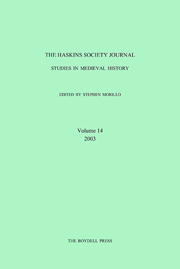Book contents
- Frontmatter
- Contents
- List of Illustrations
- Editorial Note
- Abbreviations
- 1 Even the Devil (Sometimes) has Feelings: Emotional Communities in the Early Middle Ages
- 2 Alcuin, Willibrord, and the Cultivation of Faith
- 3 Henry Loyn Memorial Lecture: English Identity from Bede to the Millennium
- 4 The ‘Farm of One Night’ and the Organisation of Royal Estates in Late Anglo-Saxon Wessex
- 5 Changing Fortunes: Edwardian Anglo-Jewry and their Credit Operations in Late Thirteenth-Century England
- 6 Forty Acres and a Mule: the Mechanics of English Settlement in Northeast Wales after the Edwardian Conquest
- 7 Consanguinity and the Saint-Aubin Genealogies
- 8 Widows, Religious Patronage and Family Identity: Some Cases from Twelfth-Century Yorkshire
- 9 Desecration and Consecration in Norman Capua, 1062–1122: Contesting Sacred Space during the Gregorian Reforms
- 10 From Ego to Imago: Mediation and Agency in Medieval France (1000–1250)
5 - Changing Fortunes: Edwardian Anglo-Jewry and their Credit Operations in Late Thirteenth-Century England
Published online by Cambridge University Press: 05 September 2014
- Frontmatter
- Contents
- List of Illustrations
- Editorial Note
- Abbreviations
- 1 Even the Devil (Sometimes) has Feelings: Emotional Communities in the Early Middle Ages
- 2 Alcuin, Willibrord, and the Cultivation of Faith
- 3 Henry Loyn Memorial Lecture: English Identity from Bede to the Millennium
- 4 The ‘Farm of One Night’ and the Organisation of Royal Estates in Late Anglo-Saxon Wessex
- 5 Changing Fortunes: Edwardian Anglo-Jewry and their Credit Operations in Late Thirteenth-Century England
- 6 Forty Acres and a Mule: the Mechanics of English Settlement in Northeast Wales after the Edwardian Conquest
- 7 Consanguinity and the Saint-Aubin Genealogies
- 8 Widows, Religious Patronage and Family Identity: Some Cases from Twelfth-Century Yorkshire
- 9 Desecration and Consecration in Norman Capua, 1062–1122: Contesting Sacred Space during the Gregorian Reforms
- 10 From Ego to Imago: Mediation and Agency in Medieval France (1000–1250)
Summary
In 1850 the church of St. Michael's at Hackthorn, a small hamlet seven miles north of Lincoln, was being rebuilt. Whilst the rebuilding was taking place wooden furnishings had been commissioned from a local firm at nearby Coleby. However the proprietor of the business, a Mr Mainwaring, died in July 1850 and the church furnishings, which had not yet been officially handed over to the church, became part of his estate. His executors claimed that they had to be sold. The furnishings constituted ten lots at the sale, which was held at Coleby Hall on 31 October 1850. At the sale a surprising event happened. A Mr. Benjamin (described as a Jew of commanding stature) asked that the ten lots be put together. He then purchased all of them saying, ‘I offer £10 for the lot and where is the Christian who dare bid against me?’ To this day the furnishings are still in the church at Hackthorn, saved by a Jew whose fellows over half a millennium before were expelled from Lincoln on 1 November 1290.
That the Jews had connections with medieval Hackthorn is fairly easily documented. Isaac Gabbay, a Jew of Lincoln, in about 1250, quitclaimed his right and claim on the land, tenements and rent that he had in the village of Hackthorn to the prior and convent of Bullington.
- Type
- Chapter
- Information
- The Haskins Society Journal 142003. Studies in Medieval History, pp. 83 - 90Publisher: Boydell & BrewerPrint publication year: 2005



